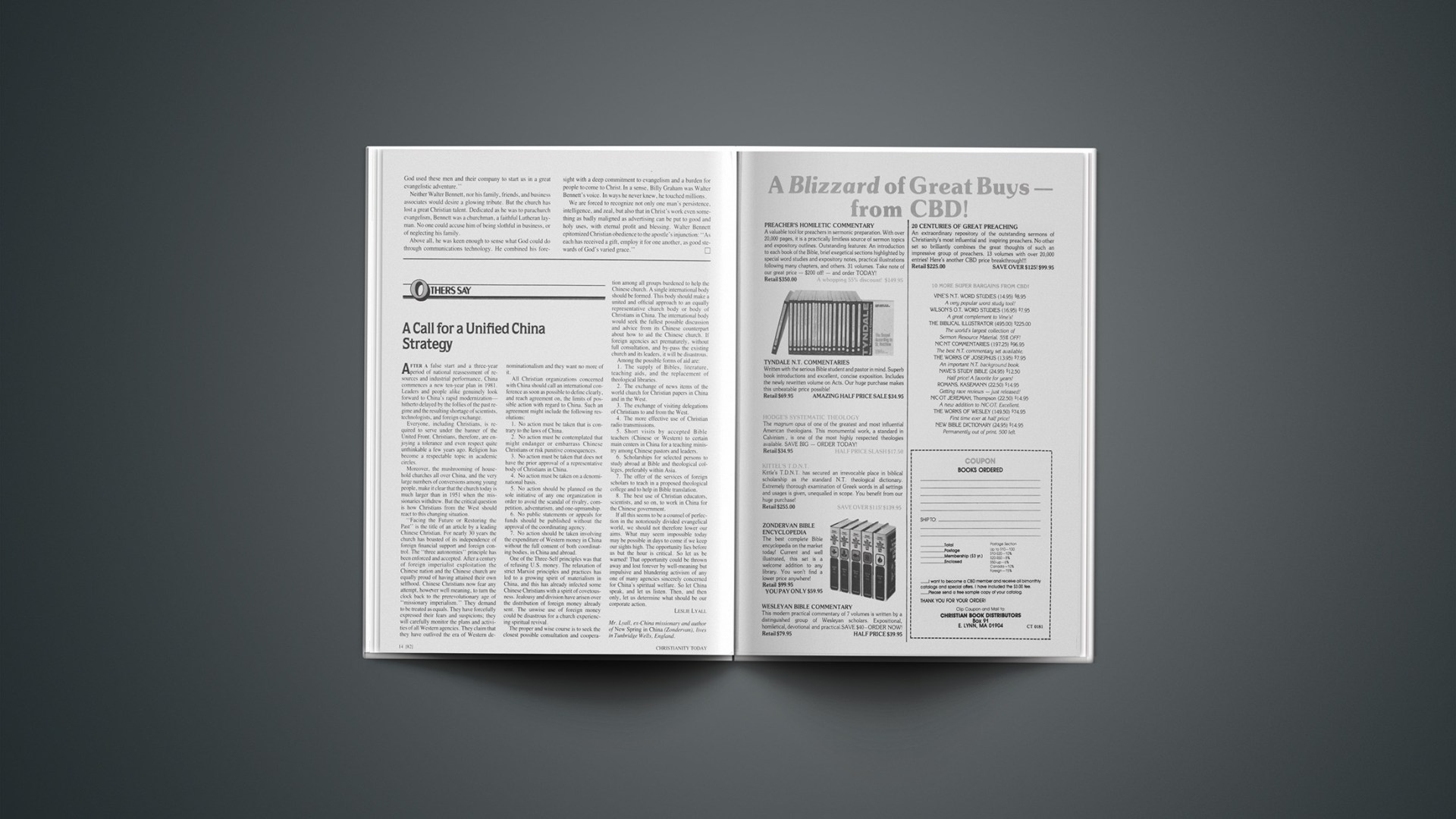After a false start and a three-year period of national reassessment of resources and industrial performance, China commences a new ten-year plan in 1981. Leaders and people alike genuinely look forward to China’s rapid modernization—hitherto delayed by the follies of the past regime and the resulting shortage of scientists, technologists, and foreign exchange.
Everyone, including Christians, is required to serve under the banner of the United Front. Christians, therefore, are enjoying a tolerance and even respect quite unthinkable a few years ago. Religion has become a respectable topic in academic circles.
Moreover, the mushrooming of household churches all over China, and the very large numbers of conversions among young people, make it clear that the church today is much larger than in 1951 when the missionaries withdrew. But the critical question is how Christians from the West should react to this changing situation.
“Facing the Future or Restoring the Past” is the title of an article by a leading Chinese Christian. For nearly 30 years the church has boasted of its independence of foreign financial support and foreign control. The “three autonomies” principle has been enforced and accepted. After a century of foreign imperialist exploitation the Chinese nation and the Chinese church are equally proud of having attained their own selfhood. Chinese Christians now fear any attempt, however well meaning, to turn the clock back to the prerevolutionary age of “missionary imperialism.” They demand to be treated as equals. They have forcefully expressed their fears and suspicions; they will carefully monitor the plans and activities of all Western agencies. They claim that they have outlived the era of Western denominationalism and they want no more of it.
All Christian organizations concerned with China should call an international conference as soon as possible to define clearly, and reach agreement on, the limits of possible action with regard to China. Such an agreement might include the following resolutions:
1. No action must be taken that is contrary to the laws of China.
2. No action must be contemplated that might endanger or embarrass Chinese Christians or risk punitive consequences.
3. No action must be taken that does not have the prior approval of a representative body of Christians in China.
4. No action must be taken on a denominational basis.
5. No action should be planned on the sole initiative of any one organization in order to avoid the scandal of rivalry, competition, adventurism, and one-upmanship.
6. No public statements or appeals for funds should be published without the approval of the coordinating agency.
7. No action should be taken involving the expenditure of Western money in China without the full consent of both coordinating bodies, in China and abroad.
One of the Three-Self principles was that of refusing U.S. money. The relaxation of strict Marxist principles and practices has led to a growing spirit of materialism in China, and this has already infected some Chinese Christians with a spirit of covetousness. Jealousy and division have arisen over the distribution of foreign money already sent. The unwise use of foreign money could be disastrous for a church experiencing spiritual revival.
The proper and wise course is to seek the closest possible consultation and cooperation among all groups burdened to help the Chinese church. A single international body should be formed. This body should make a united and official approach to an equally representative church body or body of Christians in China. The international body would seek the fullest possible discussion and advice from its Chinese counterpart about how to aid the Chinese church. If foreign agencies act prematurely, without full consultation, and by-pass the existing church and its leaders, it will be disastrous.
Among the possible forms of aid are:
1. The supply of Bibles, literature, teaching aids, and the replacement of theological libraries.
2. The exchange of news items of the world church for Christian papers in China and in the West.
3. The exchange of visiting delegations of Christians to and from the West.
4. The more effective use of Christian radio transmissions.
5. Short visits by accepted Bible teachers (Chinese or Western) to certain main centers in China for a teaching ministry among Chinese pastors and leaders.
6. Scholarships for selected persons to study abroad at Bible and theological colleges, preferably within Asia.
7. The offer of the services of foreign scholars to teach in a proposed theological college and to help in Bible translation.
8. The best use of Christian educators, scientists, and so on, to work in China for the Chinese government.
If all this seems to be a counsel of perfection in the notoriously divided evangelical world, we should not therefore lower our aims. What may seem impossible today may be possible in days to come if we keep our sights high. The opportunity lies before us but the hour is critical. So let us be warned! That opportunity could be thrown away and lost forever by well-meaning but impulsive and blundering activism of any one of many agencies sincerely concerned for China’s spiritual welfare. So let China speak, and let us listen. Then, and then only, let us determine what should be our corporate action.
LESLIE LYALL1Mr. Lyall, ex-China missionary and author of New Spring in China (Zondervan), lives in Tunbridge Wells, England.










